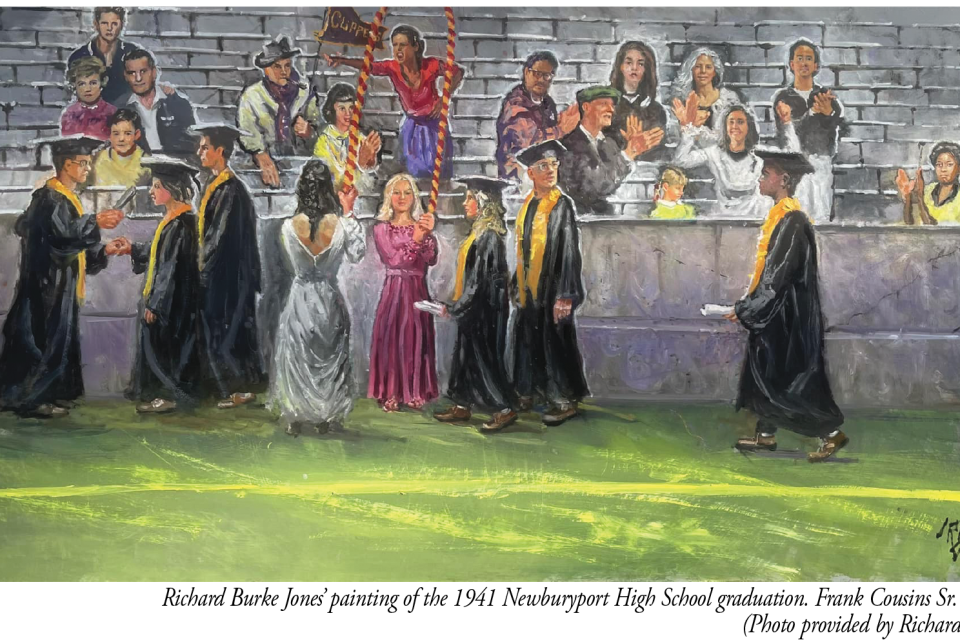NEWBURYPORT – Gertrude “Trudy” Woodard, the mother of a family that included folksinger James Taylor, sang from the stage before joining the line of students to accept her diploma in the 1941 graduation ceremony at Newburyport High School.
During the ceremony, she witnessed an incident of racial discrimination that influenced her life and the lives of several of her classmates.
The incident, which The Town Common wrote about three years ago, is now the subject of a new painting by local artist, City Clerk Richard Burke Jones.
The painting depicts the graduating class walking in a procession to accept their diplomas from Dr. Rupert Nock, a 30-year-old, first-year principal, who would have the middle school named for him.
At the request of the then-Mayor James Carens, Nock moved Frank Cousins, the only African American student in the class, to the rear of the line to walk alone. According to a classmate, who was traumatized by the event, it was Ruth Carens, the mayor’s daughter, who asked her father to have Cousins moved to the rear. He was supposed to walk next to her, near the front of the line.
Jones’ painting, which he unveiled recently, depicts Nock handing out the diplomas to the graduating class that included Ruth Carens at the front of the line and Trudy Woodard behind her, wearing a white bow in her hair. Also portrayed are Norman “Normie” Wells, looking back at Cousins, and Cousins himself walking alone at the rear.
“When it was time for the graduates to line up, my father was told he could not line up with graduates whose names began with the letter C,” Cousins’ son and namesake, Frank Cousins, Jr., said publicly in a sermon four years ago at the First Religious Society Unitarian Universalist Church in honor of the birthday of Dr. Martin Luther King Jr.
“Instead, he had to walk alone,” the younger Cousins said.
Jones, an accomplished painter who is well-known for painting scenes of the Newburyport area, decided to paint the Cousins’ incident after attending the unveiling of a new informational plaque by the Newburyport Black Initiative in the city’s Brown Square. The plaque, which celebrated African-American soldiers and sailors, references the graduation incident in telling the stories of the Cousins’ family. Three of the sons, including Frank Cousins, Sr., served in the military during World War II.
Charlie Cullen, the retired chair of the Provident Bank, who also graduated from NHS a few years later, told Jones the story of the racial snub of Cousins.
“As I did further research, surprising and disturbing facts emerged about the incident,” Jones wrote on social media. “The daughter of the Mayor at the time, beseeched her father to pressure the Principal so that she would not have to walk in line with a person of color. The principal was young and new and lived proximate to the Mayor at the time.”
Explaining why he was enamored with the story, Jones wrote: “I thought by doing this painting, I might remind all of us that even in our beloved Newburyport, certain of our cherished residents have been victims of needless discrimination.”
Cullen suggested a title for the painting: By Himself, But Not Alone. “He walked by himself that day, but he was not alone then or forever,” Cullen wrote to Jones.
The younger Cousins, who served as a city councilmember, state legislator, county sheriff and president of the Chamber of Commerce, said last week he loves the painting. “I was totally surprised. It is amazing. It is really wonderful.”
“(The incident) affected a lot of people,” Cousins said. “Good things happened because of it. There was a lot of giving in that class.”
He decided last week to buy Jones’ painting and donate it to the city, which he hopes will hang it at NHS where it could be “a teaching moment” for the students.
In the painting, Jones painted Cousins’ parents, “watching their son walking behind his white classmates.” For the other audience members, he used as models his sister and daughters, other members of the City Clerk’s office and the Cleaver family from the television show Leave it to Beaver. He wrote that the Cleavers represented “the status quo in America at the time.”
He begged forgiveness for “that artistic license” since the show was not broadcast until 1957, 16 years after the graduation incident.
The elder Frank Cousins did not let the incident make him bitter, his son said, and he tried to shield his son from the negative impact of racism. He never talked with his son about the graduation.
But the incident had a powerful impact on several of the classmates, notably Trudy Woodard and Norman Wells. Some members of the class, according to their children, were too traumatized by it to discuss it.
Wells, who ask his friend to walk with him, became an executive with the telephone company and worked to secure jobs for the Cousins’ family members and other black employees.
Woodard, who became Trudy Taylor, the matriarch of the famous family of James, Livingston, Kate and Hugh Taylor, detested segregation throughout her life. She told a reporter at The Charlotte Observer that she carried the Cousins’ incident in her head.
Raised on Rings Island, she had moved to North Carolina when her husband, Dr. Issac Taylor, was named dean of the University of North Carolina Medical School. After moving south, she fought segregation in North Carolina, helping her husband integrate the medical school by admitting female and black students. She also helped elect the first black mayor of Chapel Hill.
Trudy Taylor wrote to the Cousins’ family in 1999, telling them, “In my head I took Frankie with me where ever I went.” She called her motivation to fight for social justice her “Frankie Cousins moments.” ♦




